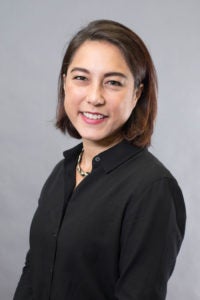New Faculty: Professor Laura Moy
August 26, 2019
In an era of expanding video surveillance, data brokers and facial recognition software, what do we mean when we talk about “privacy”?
For Professor Laura Moy, who works at the intersection of privacy and technology, it goes far beyond the classical conception of privacy, the right to be left alone and to be free from government overreach. Crediting thinkers such as Georgetown Law Professor Julie Cohen and Cornell Tech Professor Helen Nissenbaum, Moy describes a more expansive notion that has practical implications in a digital age.

Professor Laura Moy.
“Privacy is about so much more than just being able to protect your private sphere of life,” she said, noting that the concept of privacy has evolved over the past several decades. “It is about…self-actualization, the ability to have and use information that enables you to fully realize the person that you want to be, particularly in a digital context…it’s [also] the right not to have information about you used in a way that you find harmful or concerning.”
The current uses of data, Moy points out, affect civil rights, public health and the entire body politic in ways we can agree are unhealthy.
“The privacy problems that we’re looking at today are the spread of misinformation and propaganda on content distribution platforms, it’s the amplification of hate speech on social media, it’s discriminatory advertising practices that fail to present people with opportunities to improve their station in life through education or job training or housing,” she said. “These [are] problems that affect all of society.”
Moy came to privacy law via a stint at the Manhattan District Attorney’s office in the mid-2000s, where she worked as a paralegal and later analyzing cell site location information for court cases. The lack of oversight of her own work, as well as a lack of scrutiny either from judges or opponents in courts troubled her, raising questions about what sorts of human errors get overlooked when people rely too heavily on technological solutions.
“Here I am at trial, presenting a case against a defendant who may go free or to prison based on what I show in court, and no one’s really double-checked my work,” she said.
At New York University Law School, she took courses in intellectual property and copyright law, interning at a privacy organization in Washington, D.C., one summer.
And since Georgetown Law has long recognized the connection between technology and social justice, with one of the first clinics in the country to focus on that intersection, she came here after earning her J.D., spending two years as a clinical teaching fellow at the Institute for Public Representation and becoming executive director of the Center on Privacy & Technology in 2018. She’s now the director of the Communications & Technology Law Clinic, addressing issues such as police use of facial recognition technology.
These days, she’s frequently on the Hill, offering testimony to congressional committees on topics such as consumer privacy and algorithmic bias. As a native of the D.C. area and a political science major in college, she doesn’t consider this outcome entirely unforeseen.
“I had always thought that if I were going to be a lawyer, I may as well become a policy lawyer, go back to D.C. and do policy work,” she said.
Moy wants to raise awareness around policy issues, and see Congress pass a strong law in a few years’ time. For her, Georgetown Law is the perfect perch from which to do so.
“I love working at the intersection of technology and social justice, but a lot of people view those two things as separate,” she said. “It is just really nice to be focusing on technology, and have the entire context be an institution that is always asking itself how it can serve the public good, and how the work that comes out of the university and the research that comes out of the university can be in the interest of social justice.”